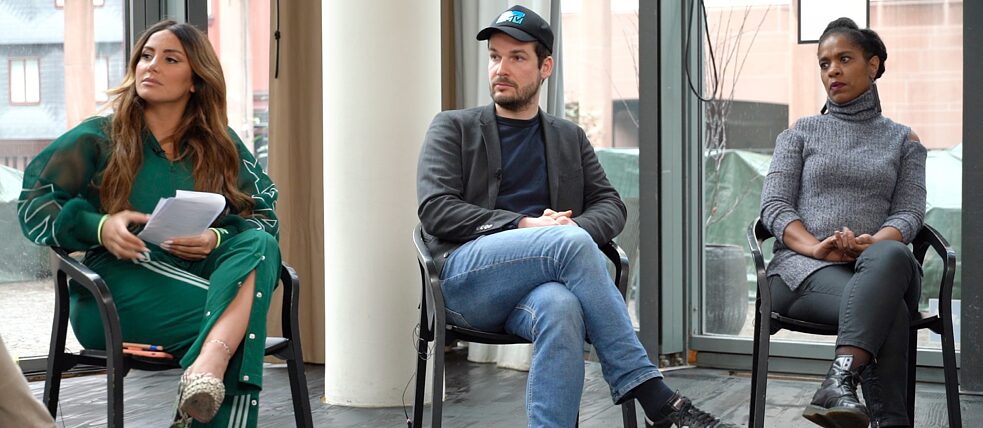Fight Against Racism
Diversity Begins With Insight

Enissa Amani’s show “Die beste Instanz” is her response to the controversial WDR show “Die letzte Instanz”, and it creates space for discussion about racism with the people affected by it on a daily basis. In this interview she explains what we still need to do in order to achieve greater diversity in Germany’s media landscape.
As a response to the WDR show “Die letzte Instanz” you launched your own talkshow on Youtube: “Die beste Instanz”. What motivated you to do that, and who are you hoping to reach with the programme?
Well, I wasn’t the only one to feel angry and indignant about this lamentable show and the racism it was churning out. Thousands of people on a diverse range of platforms were mind-bogglingly appalled about the fact that there is still too little information about structural racism in Germany. Even now the individuals concerned, and in particular the experts on the subject, rarely have the opportunity to speak out. It feels as though it’s always that same bunch of “regulars” consisting of the diehards who actually pat each other on the back for their ignorance.
I didn’t plan to make this show at all. To begin with I made a statement video, in which I gave my opinion on the programme clearly and concisely. In my video I appealed to the WDR to make a show to “set things straight”, featuring experts in the field who would be able to explain the impact of such innocuously packaged ideas, but they didn’t respond.
Then, once my team and I had got Die beste Instanz up and running in the space of four days and we were receiving incredibly positive feedback online, the WDR and other broadcasters were suddenly approaching me and inviting me to take part in relevant anti-racism shows. I turned them all down. After all the time I had already done the show and said everything that needed to be said. I’m very grateful for all the attention and the wonderful thanks I received from thousands of people who had been hurt before. That made it worth doing.
The show was very popular on social media, and in the end it received the Grimme Online Award. What does this prize for the show mean to you? Do you feel as though you’ve opened a can of worms?
Of course the Grimme Online Award was a great delight and honour. But the biggest take-away is the realisation that it isn’t just populist content that can reach a mass audience and have an effect. In contrast with the approach of some mainstream media that also use their shows to spread fear, unrest and prejudice. Even older people can be motivated to take new ideas on board. A good example of that is the following comment on Youtube under the Die beste Instanz video: “I’m a white man over the age of 60 and I used to consider myself really enlightened – but this show was a wake-up call, a slap in the face. Enissa for President!” I find that really sweet and so incredibly touching.
What is the situation regarding diversity in the German media scene, and what is still left to be done?
There isn’t any. What we do have again and again are just tokens with an alibi function, which are used to create the impression of diversity. I have often been made into a token myself. There are a few shows presented or created by Black, Indigenous, People of Colour (BIPoCs), which is a very good thing. However, the way producers put this into practice is not authentic or consistent if the show then reflects umpteen instances of racism.
If most shows in the German media landscape are not diverse and perceived 98 per cent of management-level bosses at the broadcasting companies are white hetero men, if minorities and marginalised individuals keep being given the same roles, then it’s the opposite of diversity. The people who are part of the structural problem are by no means insightful – they are not willing to action genuine change or practise true equality. They live, as so eloquently put by Tupoka Ogette in her book exit racism, in their “happy land”. They are then absolutely shocked when they are confronted with their privileges. And then they famously respond with: “Me? All people are the same to me. I don’t see colour.”
These people neither see everyone as equals, nor are all individuals treated fundamentally the same. That’s a fact. Statements such as “I know an Arab, but he’s really nice and modern” are then the expression of their tolerance. That’s not “everyone’s equal”, it’s a condescending attitude. Furthermore, people like them can decide when and where they view me and others equally and where they do not. I was a foreign woman, I couldn’t say: “But everyone’s equal!” – the others were more “equal” and I was permanently obliged to prove myself, to belong and not to appear foreign if at all possible. Things are different in this respect today, I and many others no longer want to “belong” at all.
How could diversity in the German media be encouraged and reinforced? What structures and processes are needed to achieve this?
It’s a process relevant to the whole of society, involving many factors and many movements. As long as the majority of people want to see shows that reflect stereotypes and racism, they will continue to be produced like this. We’re a long way from a situation in which a cosmopolitan, pluralistic society is portrayed and promoted in the media – and protected by it. More resistance is needed, more countermovements, more education and more courage.
This interview was conducted in written form. The questions were asked by Marta Krus, trainee at the online editorial team of the Goethe‑Institut in Munich.